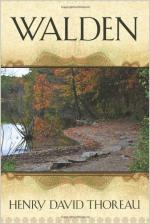|
|
Walden Spring
Walden Pond is always the last one in the area to break up both because it has no stream running through it, and because it is so deep. However, Walden undergoes a steady and uninterrupted temperature increase while other ponds fluctuate wildly during early spring. The ice melts from the sun shining from above, as well as from the sun reflected off the water below.
"The day is an epitome of the year." Spring, pg. 241
The pond booms in the morning and at night when the ice is tight. Then it is loose during the heat of the day and stops making noise. It melts in layers, and it happens very suddenly. Here, Thoreau inserts the story of the man who took his boat down the Sudbury River to Fair Haven pond, which was still covered in ice. He hid in the bushes to hunt ducks, and heard a groan, which he thought was some sort of animal. It turned out to be the sound of the ice hitting the pond's edge and breaking up.
The next thing that Thoreau notices and celebrates is the snow melting on the railroad banks. The snow comes down the sides of the bank in swirls of different, beautiful colors that look like leaves. Thoreau spends a while describing leaves, calling them the outward expression of the earth. Because the sun affects one side of the bank at a time, it looks as if earth is experimenting with its palette - one side is full of spirals, the other remains snow-covered. Everything is a sort of leaf in nature: wings, trees, and feathers, even ice as it begins to form. The earth itself is leaf-shaped, with its rivers spreading out through the continents. The towns are insects. The swirls begin again each morning, and remind Thoreau of how blood vessels might be formed as a fetus grows, branching out. He likens people to a mass of thawing clay. This thawing and spreading out is like the release of excrement, but Thoreau believes that this is good. It assures us that even Nature has bowels. This is the first part of spring, before the poetic part. It is when the earth is proven to be alive again.
Next come the first buds of spring, as the frost disappears from the ground. The squirrels came back to the house under the floorboards. Thoreau found the first sparrow of spring to be very exciting. The grass is like flames of warmth from the earth as it responds to the sun's warmth. The sparrow is helping to crack the ice of Walden with his calls. Walden is becoming alive again, but very suddenly, so that Thoreau describes spring and the change in light as a "crisis."
Topic Tracking: My House Outdoors 6
The robins came and proved that spring was here; the first spring night for Thoreau in his cabin. After them came the geese and pigeons. Then, with a gentle rain, the prospects get better (and greener).
"Why the jailer does not leave open his prison doors - why the judge does not dismiss his case - why the preacher does not dismiss his congregation! It is because they do not obey the hint which God gives them, nor accept the pardon which he freely offers all." Spring, pg. 251
At the end of April, Thoreau saw a hawk while fishing. First he heard a rattling and then he saw the extraordinarily graceful hawk. It went back and forth from tumbling through the air to gliding on the wind. It seemed separated from its mother and the land, almost suspended in air.
Topic Tracking: Awakening for Reform 5
"when the wild river valley and the woods were bathed in so pure and bright a light as would have waked the dead, if they had been slumbering in their graves, as some suppose. There needs no stronger proof of immortality. All things must live in such a light. O Death, where was thy sting? O Grave, where was thy victory then?" Spring, pg. 252
Without the wilderness around a village, a village would remain stagnant. We need to explore and be refreshed by nature. Thoreau is refreshed by hearing the whip-poor-will, brown-thrasher, veery, wood-pewee, chewink, and other birds at the beginning of May. These sounds take us to the end of Thoreau's first year in the woods. He states simply that the second year was very similar.




